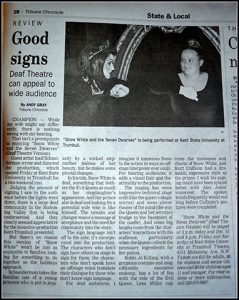
The Deaf Snow White Performance Project
The purpose of the Deaf Snow White Project was to promote better understanding across D/deaf* and hearing worlds through the sponsorship of a series of unique theatrical events. The mission of Kent State University is to discover, create, apply and share knowledge, as well as to foster ethical and humanitarian values in the service of Ohio and the global community. As an eight-campus educational system, Kent State offers a broad array of academic programs to engage students in diverse learning environments that educate them to think critically and to expand their intellectual horizons while attaining the knowledge and skills necessary for responsible citizenship and productive careers.
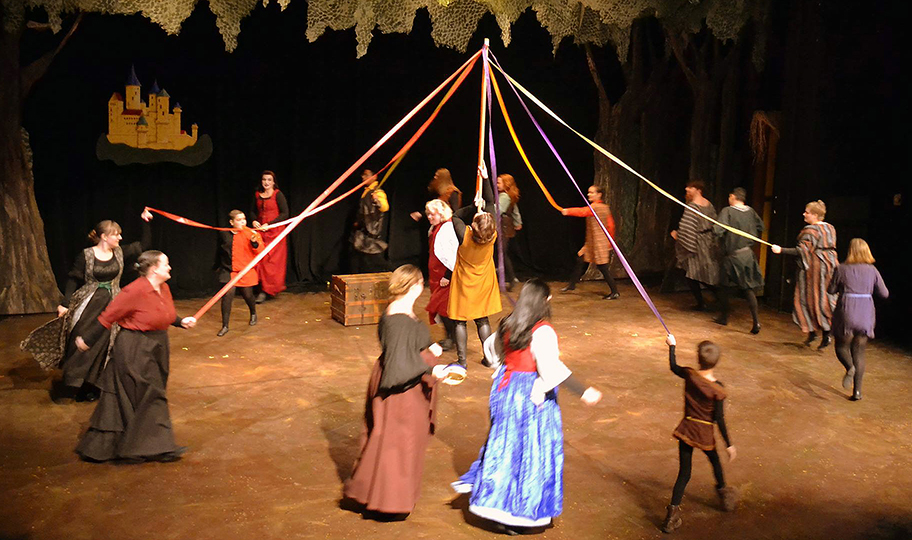
Opening Scene: the Minstrels are in town!
Kent State University—Trumbull received financial support to stage a special production of Snow White and the Seven Dwarves (a.k.a. Deaf Snow White), written by Iosif Schneiderman, Aaron Weir, and William Morgan. The play is an experimental theatre piece that blends gesture, pantomime, American Sign Language, and spoken English to retell the classic fairy tale from a Deaf culture perspective. Schneiderman worked with a group of actors and designers from both the campus and the surrounding community. In addition to the regularly scheduled rehearsals, Schneiderman also offered two workshops on the art of visual communication, open and free of cost to both the cast and the general community (except for those requesting special certification).
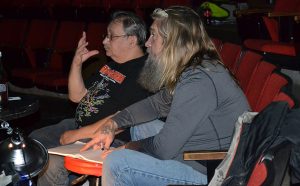
“Beautiful,” signs Iosif Schneiderman (Director) as Verne Taylor, Jr. (Assistant Director) looks on.
Iosif Schneiderman has a lifetime of professional experience in working in Deaf theatre. Having won first prize in Moscow’s Festival of Mime, he was invited to join Moscow’s Theatre of Expression and Gesture, where he performed for twenty-eight years. In 1973, he was recognized for his performance at the World Festival of Mime in Czechoslovakia, and in 1989, he performed at the Deaf Way Festival in Washington. Schneiderman was invited by David Hays, founding director of the National Theater of the Deaf, to join his renowned company, where he appeared in such productions as Treasure Island, Curiouser and Curiouser, and One More Spring, which was shown on Public Television. Schneiderman created and directed Goya, which was presented at Gallaudet University and featured as the grand opening performance for Deaf Way II. In 2003, he played five different roles in DeafWest’s acclaimed production of Big River, the musical version of Huck Finn. This production was seen on Broadway, nominated for a Tony Award, and subsequently toured throughout the United States.
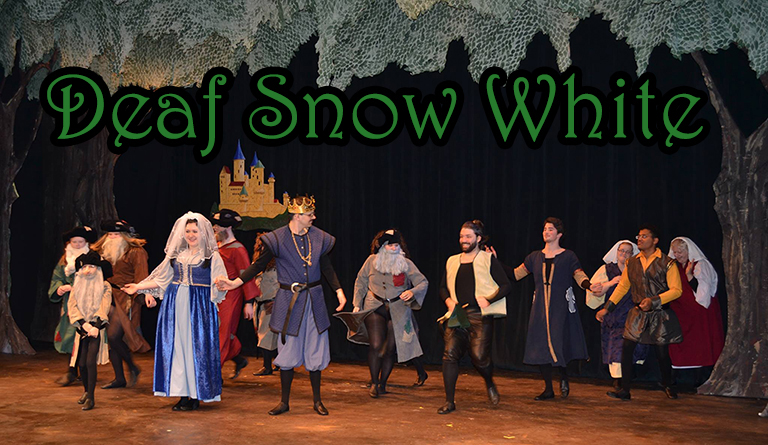
Schneiderman adapted Snow White (with William Morgan and Aaron Weir) so that the story is seen from a Deaf perspective. Snow White, for example, is Deaf in the play, and she finds her counterpart in the Prince who awakens her from her sleep. Through directing the play, Schneiderman shared his expertise in the theatre of gesture and mime with local performers, thus giving them an exceptional opportunity to improve their skills in physical-visual communication. Moreover, the entire production gave audiences the chance to reflect on issues related to identity and deafness.
Visual Gesture Communication (VGC) Workshops
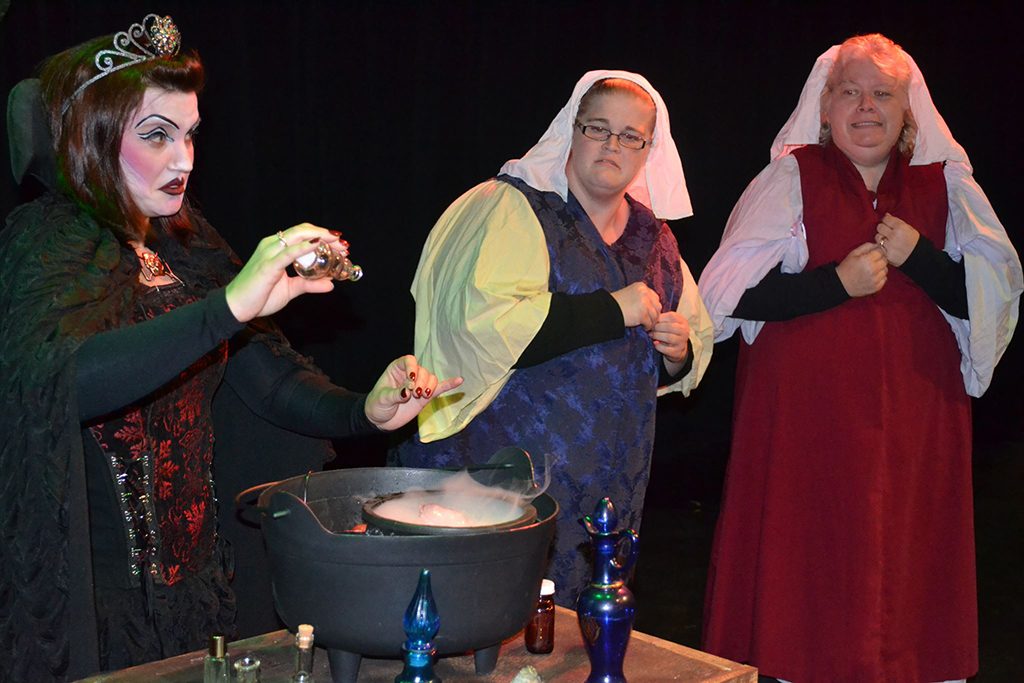
The Evil Queen (Bobbie Jo Killing) brews one of her poisons as her Hearing Maid (Tiffany Mulloy) and Deaf Servant (Pam Beish) look on in horror.
Iosif Scheiderman and Verne Taylor, Jr. held a four-part workshop over the course of two consecutive Saturdays on November 9 and 16. All cast members were required to attend the workshops. All four workshops were well attended by both hearing and Deaf individuals: students, community members, and members of the cast. Each part lasted two hours, with everyone gathering together for lunch between the morning and afternoon sessions. The focus of all four workshops was upon the development of visual communication skills, universal communication through VGC, use of hands for self-expression, and a greater understanding of American Sign Language classifiers, particularly as they relate to general visual gestures. Certificates were awarded: full attendance, partial attendance, and attendance for CPU (which was provided by Sign Language Resources and Education Center, LM Global Enterprises, LLC). Clearly, gesturing and signing posed a major challenge for several of the actors, who were hampered with their arms heavily cloaked, with their faces heavily covered in make-up, and even with highly constrictive mask, and the workshops greatly helped to address these obstacles.
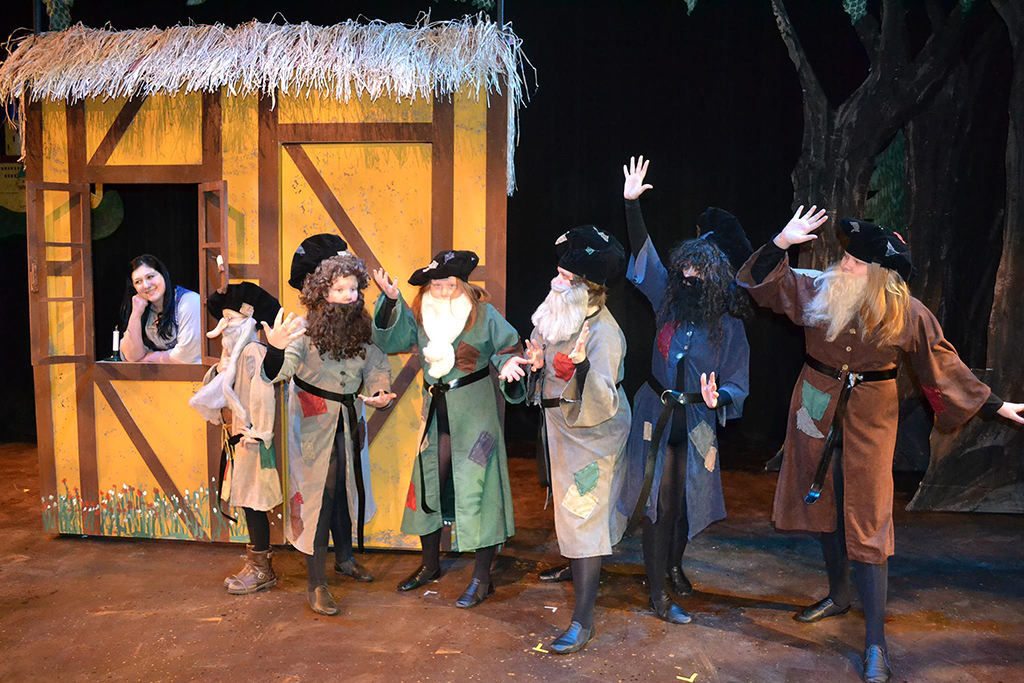
Snow White & Six of the Seven Dwarves (left-to-right): Lexa Miller (Snow White), Jaycob Whitmore (Sunday), Maggie Bork (Saturday), Brooke Earl (Friday), Katrina Bachman (Thursday), Miranda Bachman (Wednesday), and Makennah Earl (Tuesday).
Challenges

Maggie Bork, who played the dwarf, Saturday, displaying her special notebook.
A central challenge appeared in the form of communication and cultural conflicts, on all sorts of levels and in various directions. Iosif Schneiderman is a Deaf Russian whose native languages are Russian Sign Language and Russian spoken language; all his life, he has worked as a professional performer. Kent Trumbull Theatre is a community theatre (merging campus and community) with an agenda that emphasizes personal and community growth (over professional achievements). Verne Taylor, Jr. worked to serve as mediator between Schneiderman and the rest of the cast/crew, all of whom were American (native Ohioans) and most of whom were hearing and unfamiliar with either Deaf or Russian cultures. Often, for example, Taylor had to help interpret Schneiderman’s broken ASL for the sign language interpreters. In other words, the process of communication between Schneiderman was from Russian/American sign language to American Sign Language to spoken English. While everyone worked hard to understand each other, certain Russian gestures and/or Deaf culture facial expressions were ultimately misinterpreted, offending cast and crew. At the same time, Schneiderman’s leadership was often chaotic, and self-contradictory (some would call this “old-school” directing). In short, much of the clash seemed rooted in a battle of theatrical practices (the goals of professional perfectionism vs. those of community/educational growth), and they became reduced to a more personal fight between men and women, rather than one between Deaf and hearing. However, the children in the cast loved working with Schneiderman.
In other words, this chaos seemed to affect the adults significantly more than the children, who were generally enthusiastic about the production, right to the very end. Both Scheiderman and Taylor, indeed, seemed to have a gift for working with children. There were neither behavioral nor disciplinary issues, for example. For another example, the children frequently seemed both in awe of and inspired by the directing team, and many were motivated to learn a great deal of American Sign Language, both for use on-stage and off-stage. For the children, there was much silliness and laughter—theatrical play and moments of exploratory visual expression that resulted in subtle developments of greater communication and acting skills.
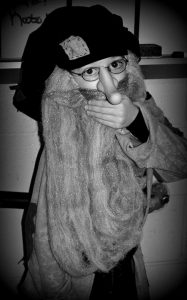
The youngest member of the cast, Jaycob Whitmore, who played the dwarf known as Sunday, proudly displaying his nose and beard.
This enthusiasm among the children seemed to inspire the adults (cast and crew) to work harder, to overcome personal conflicts (or at least tolerate cultural differences, even when they seemed abusive). Ultimately, the bottom line became clearly drawn: everyone wanted to be remembered for a positive performance experience. Everyone wanted the show to go well. The adults worked through the sexism, audism, and turf-battles to make the show happen. The children, mostly unaware of the adult conflicts, worked hard to learn their lines and to express them well, be they in spoken English and/or American Sign Language. In other words, despite the personal and professional challenges that typify cross-cultural conflicts (including issues of miscommunication and/or misunderstanding), everyone worked hard to work together and in so doing, learned a great deal about each other and about themselves.
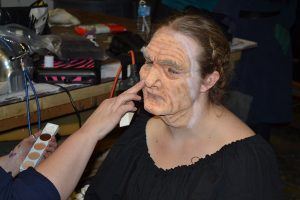
Make-up artist Kerri Rickard is working a mask onto Victoria Kaczmarek (Peddler Woman).
Cast
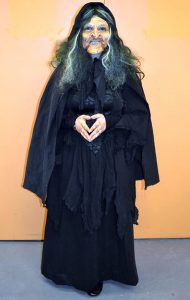
Victoria Kaczmarek as the Evil Queen transformed into a Peddler Woman.
Katrina Bachman (Thursday)
Miranda Bachman (Good Queen/Wednesday/Voice of Snow White in castle)
Darren Ball (Townsperson)
Pam Beish (Deaf Servant)
Maggie Bork (Saturday)
Kurt Cullison (Deaf Prince)
Brooke Earl (Friday)
Makennah Earl (Tuesday)
Christine Fowler (Interpreter for the Queen)
Shane Glaeser (Huntsman)
Alex Jones (Minstrel Leader/Voice of Prince)
Victoria Kaczmarek (Peddler Woman/Voice of Mirror)
Bobbie Jo Killing (Evil Queen)
Lexa Miller (Snow White)
Tiffany Mulloy (Hearing Maid/Voice of Snow White in forest)
Aiden Scott (Townsperson)
Michael Smithberger (Monday/King/Voice of Thursday)
Melanie Spurk (Mirror/Voice of Deaf Peddler)
Lacey Tolla (Old Woman)
Jaycob Whitmore (Sunday)
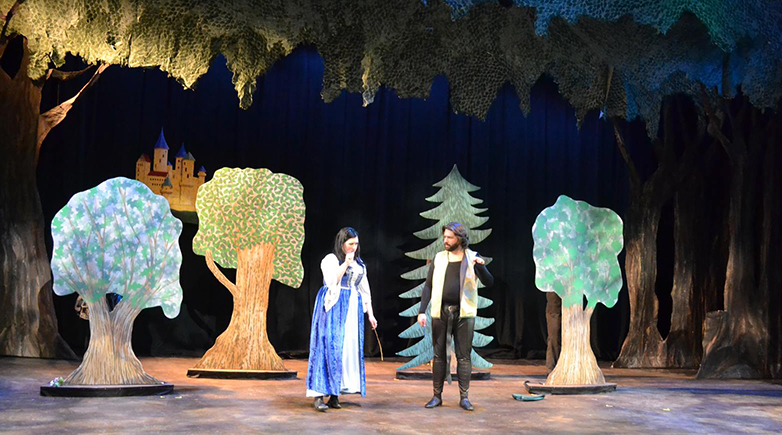
Snow White (Lexa Miller) with the Huntsman (Shane Glaeser).
Production Team
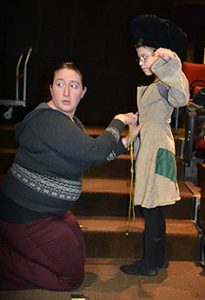
Costume Design/Costumer/Asst. Stage Manager Eileen Janis-Larson fitting Jaycob Whitmore with his costume.
Director: Iosif Schneiderman
Assist. Director & Sign Master: Verne Taylor, Jr.
Scenic Design/Tech Director: Tony E. Kovacic
Stage Manager: Tina Janis
Costumes & Assist. Stage Mgr.: Eileen Janis-Larson
Choreographer: Dana Warren-Tolios
Assistant Choreographer: Darian Brogden
Make-up Design: Kerri Rickard
Lighting Design: Leslie Brown
Sound Design & Deaf Culture Facilitator: Bill Morgan
Props: Kathi Kovacic
Sound Board Operator: Angell Lipps
Light Board: Ali Ozimek
Back Stage Crew: Daniel Brown
Rehearsal Interpreters: Christine Fowler & Tiffany Mulloy
Artwork: Dave Ruple
Office Manager: Brandy Mayoras
Coordinator of Theatre: Daniel-Raymond Nadon
Fundraising: Gary Ciuba, Carol Robinson, & Linda Mahmood
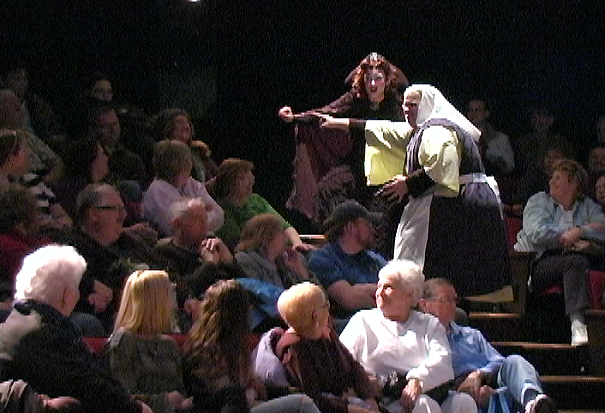
Funding and Support
 Kent Trumbull Theatre
Kent Trumbull Theatre
Kent State University at Trumbull Diversity in Action Council
Kent State University at Trumbull ASL Club
Kent State University Division of Diversity, Equity and Inclusion
Kent State University Department of English
Community Foundation of Mahoning Valley
Triple T Foundation
Hine Memorial Fund (Youngstown Foundation)
Hands United We Stand
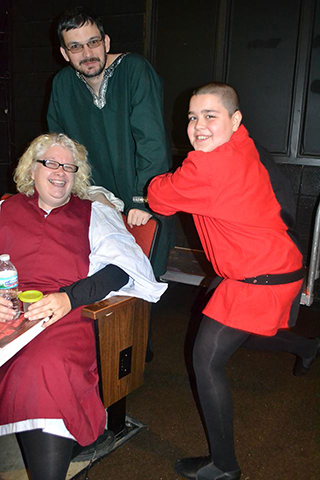
Pamela Beish (Deaf Servant), Kurt Cullison (Deaf Prince) laughing with Beish’s son, Aiden Scott (Townsperson).

